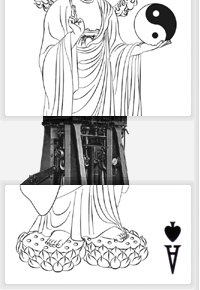From Chatterjee, R. Wittgenstein and Judaism. Peter Lang Publishing, 2005.
‘Telling people what they don’t understand is pointless, he [Wittgenstein] says, even if you tell that they won’t be able to understand, which often happens with a loved one… People have to be kept out of a room containing something they won’t understand by putting a lock on the door for which they do not have the key (Culture & Value; 7e). Recognizing the failure of understanding immediately results in a search for the key by those who really want to know the significance of the room’s contents; other may not even see the lock: “The honorable thing to do is to put a lock on the door which will be noticed only by those who can open it, not by the rest” (C&V; 8e)’ (p.63)
“Yes, a key can lie for ever in the place where the locksmith left it and never be used to open the lock the master forged it for” (C&V; 54e) (quoted in p.63)
cf.
‘Maimonides used the lock-and-key metaphor himself in speaking of “a key permitting one to enter places the gates to which were locked”’ (p.63)



5 留言:
猶太人有云,猶太教刻心傳統乃是「始於摩西,止於摩西」。始者即領猶太人出埃及的摩西,止者即十二世紀猶太哲學家邁蒙尼德 Maimonides(其希伯來文全名為摩西.邁蒙之子 Moshe ben Maimon),可見邁蒙尼德在猶太教中的重要性。
Thanks! I see Maimonides in books from time to time but did not recognise his significance being「始於摩西,止於摩西」.
That you mentioned the exile recalled me another thing I read in another book about W.: the Hebrew word Kadosh has both the meaning of holy and separateness, and that a Jews (theme of discussion in the chapter) cannot remind himself of becoming holy without being "separate".
The lock is overlooked because we fail more often than not to acknowledge the cognitional value of a question. The ultimate foundation of truth lies precisely in our existence as a questioning being: it is only in questioning, the primordial form of knowledge, that we lay the ground for the distinction between appearance and reality. As Ortega y Gasset says, the ultimately astonishing thing is that man has problems at all. When we forget the question, we consign ourselves to Limbo.
Yes while I think to ask the right question in a right way is of equal importance.
"Right" means we are 100% clear of the words we are using to convey our arguments, no misunderstanding or obstacles whatsoever in the words we use, only in this way does the conversation - the process of questioning - become meaningful, which means, in a mundane sense, no energy is wasted on clarification during the course of questioning.
It is good to finish a task with the least amount of energy.
Clarification of words is a must. It is the path towards truly meaningful questioning.
Questioning can be termed as a process of digging out truth / true knowledge / reality, which is always there (unlocking). 工欲善其事, 必先利其器. Mis-use of any word in a question / conversation will inevitably lead to overlooking the lock.
Back to square one. How can we be sure of "100% clear of the words we are using"?
Have to beware of illusion as well - that one thinks one understands (has found and opened the lock) but actually one does not.
發佈留言